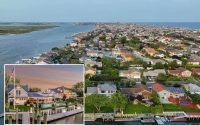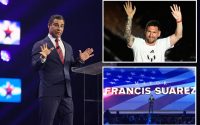Trump might use evidence from criminal case to burn witnesses
NEW YORK — New York prosecutors have asked a judge to bar Donald Trump from using evidence from his criminal case to attack witnesses, citing what they say is the former president’s history of making “harassing, embarrassing, and threatening statements” about people he’s tangled with in legal disputes.
The Manhattan district attorney’s office filed court papers Monday asking Judge Juan Manuel Merchan for a protective order that would put strict guardrails around Trump’s access to and use of evidence turned over by prosecutors prior to trial. That kind of evidence sharing, called discovery, is routine in criminal cases, and is intended to help ensure a fair trial.
Prosecutors want to block Trump from posting evidence to social media or providing it to third parties. They also want to restrict how he views certain sensitive material, asking that he do so only in the presence of his lawyers — and that he not be able to copy, photograph or transcribe those records.
Trump “has a longstanding and perhaps singular history of attacking witnesses, investigators, prosecutors, trial jurors, grand jurors, judges, and others involved in legal proceedings against him,” Assistant District Attorney Catherine McCaw wrote.
That behavior, she said, has put “those individuals and their families at considerable safety risk.”

Merchan did not immediately rule on the prosecution’s request. McCaw, in her filing, asked him to schedule a hearing on the matter next week.
Email messages seeking comment were left with Trump’s lawyers.
Prosecutors first raised concerns about Trump potentially weaponizing the discovery process at his April 4 arraignment on charges that he falsified records at his company as part of a broader 2016 scheme to make secret hush-money payments to bury allegations of extramarital sexual encounters. Trump has denied wrongdoing — or having extramarital affairs — and pleaded not guilty.
With Trump sitting at the defense table just feet away from her, McCaw told Merchan that a protective order was needed to “ensure the sanctity of the proceedings as well as the sanctity of the discovery materials.”
At the time, McCaw said prosecutors and Trump’s lawyers were close to a joint agreement with many of the restrictions prosecutors are now asking Merchan to impose. Negotiations later broke down, leading prosecutors to seek the judge’s intervention.


